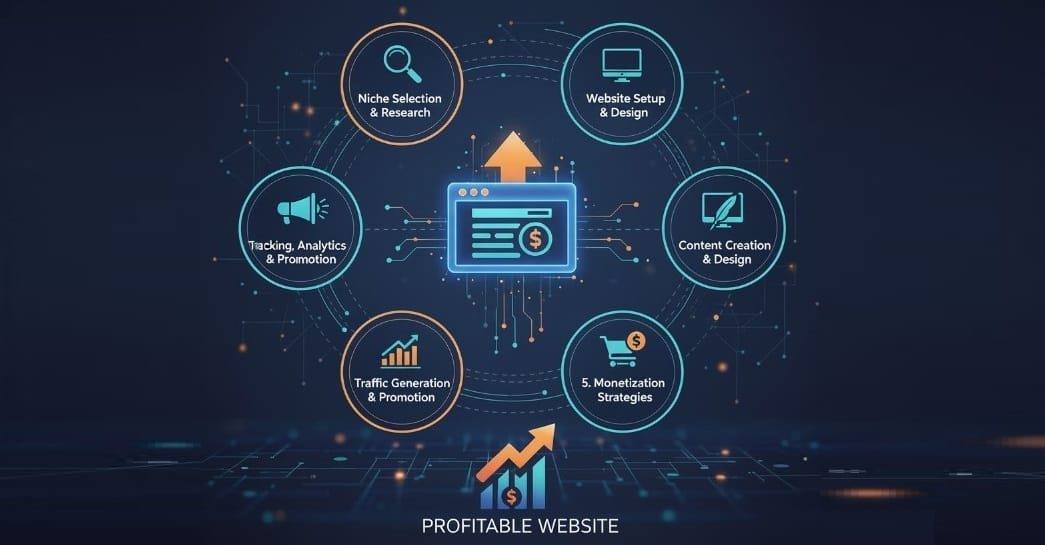Introduction
Affiliate marketing is one of the most effective ways to earn online income, but success starts with a well-structured, professional website. A properly designed affiliate website helps you attract visitors, build trust, and convert readers into buyers.
In this guide, we’ll walk you through how to build a profitable affiliate marketing website from scratch — including niche selection, website setup, content strategy, SEO, and monetization techniques.
⚙️ Step 1: Choose Your Niche
The foundation of a profitable affiliate website is a focused niche.
Tips for selecting a niche:
- Pick a niche you are passionate about or knowledgeable in.
- Evaluate demand and competition using tools like Ahrefs, SEMrush, or Google Trends.
- Ensure there are affiliate programs and products to promote.
- Target a niche with a balance of evergreen content and seasonal trends.
💡 Pro Tip: Smaller niches often convert better because audiences are highly targeted and solutions are in demand.
⚙️ Step 2: Pick the Right Domain and Hosting
- Choose a brandable, memorable domain name.
- Prefer .com, .net, or .org for credibility.
- Use reliable hosting services optimized for WordPress (e.g., SiteGround, Bluehost, or Cloudways).
- Ensure fast loading speed and strong uptime — performance impacts SEO and conversions.
⚙️ Step 3: Set Up WordPress Website
WordPress is the most popular CMS for affiliate marketers because of its flexibility and plugins.
Setup steps:
- Install WordPress via your hosting provider.
- Choose a responsive and fast theme (Astra, GeneratePress, or OceanWP).
- Install essential plugins:
- SEO: RankMath or Yoast SEO
- Affiliate Management: ThirstyAffiliates or Pretty Links
- Performance: WP Rocket, LiteSpeed Cache
- Security: Wordfence or iThemes Security
⚡ Tip: Focus on speed and mobile-friendliness — Google prioritizes mobile-first indexing.
⚙️ Step 4: Plan Your Content Strategy
A profitable affiliate website depends heavily on high-quality content.
Content types for affiliate websites:
- Product Reviews — Detailed reviews with pros, cons, and recommendations.
- Comparison Posts — “Product A vs Product B” helps decision-making.
- How-to Guides / Tutorials — Solve problems and link to affiliate products naturally.
- Listicles / Best-of Guides — Example: “Top 10 Tools for Affiliate Marketing.”
- Blog Articles — Evergreen content that attracts organic traffic.
💡 Pro Tip: Use a content calendar to consistently publish posts and grow traffic.
⚙️ Step 5: Optimize for SEO
SEO is crucial for organic traffic and affiliate conversions.
Key strategies:
- Perform keyword research (Ahrefs, SEMrush, Keywords Everywhere).
- Optimize on-page SEO: title, meta description, headings, image ALT tags.
- Internal linking: Link to other relevant posts to keep visitors engaged.
- Use schema markup for reviews, products, or articles.
- Build quality backlinks from niche-relevant websites.
⚡ Tip: Long-tail keywords often convert better because they attract readers with high purchase intent.
⚙️ Step 6: Implement Affiliate Monetization
- Join affiliate programs relevant to your niche (Amazon Associates, ShareASale, ClickBank, CJ Affiliate).
- Place affiliate links strategically: within content, comparison tables, or CTA buttons.
- Use cloaking plugins for clean, trackable affiliate links.
- Track clicks, conversions, and revenue using analytics and dashboard tools.
💡 Pro Tip: Focus on high-value offers and recurring commissions to maximize earnings.
⚙️ Step 7: Build Trust and Authority
- Create an About page and Contact page to humanize your site.
- Include testimonials, reviews, and case studies.
- Maintain honesty — never promote low-quality products.
- Collect email subscribers to nurture relationships and boost repeat conversions.
⚙️ Step 8: Promote Your Website
- Share posts on social media platforms relevant to your niche.
- Guest post on other blogs for backlinks.
- Use email marketing to engage and convert your audience.
- Run paid ads if your budget allows — Google Ads, Facebook Ads, or Pinterest.
⚡ Tip: Organic traffic takes time; consistency and patience are key.
📊 Example Affiliate Website Setup
| Section | Recommendation |
|---|---|
| Niche | Health & Fitness Supplements |
| Domain | myfitnessguides.com |
| Hosting | SiteGround WordPress Hosting |
| Theme | Astra Pro |
| Plugins | RankMath, ThirstyAffiliates, WP Rocket, Wordfence |
| Content | 50 Product Reviews, 20 Tutorials, 10 Listicles |
| Monetization | Amazon Associates, ShareASale, ClickBank |
✅ Conclusion
Building a profitable affiliate marketing website takes planning, consistent content creation, and strategic promotion. By following these steps:
- Pick the right niche
- Optimize website design and speed
- Produce valuable, SEO-optimized content
- Promote affiliate products strategically
…you can create a sustainable income stream online.
Remember: Patience and continuous optimization are the keys to long-term profitability.
🚀 Call to Action
Start building your affiliate website today:
- Choose a profitable niche.
- Set up WordPress with the right theme and plugins.
- Publish high-quality, SEO-optimized content.
- Join relevant affiliate programs and monetize your site.
With the right approach, your affiliate marketing website can become a reliable source of passive income.


